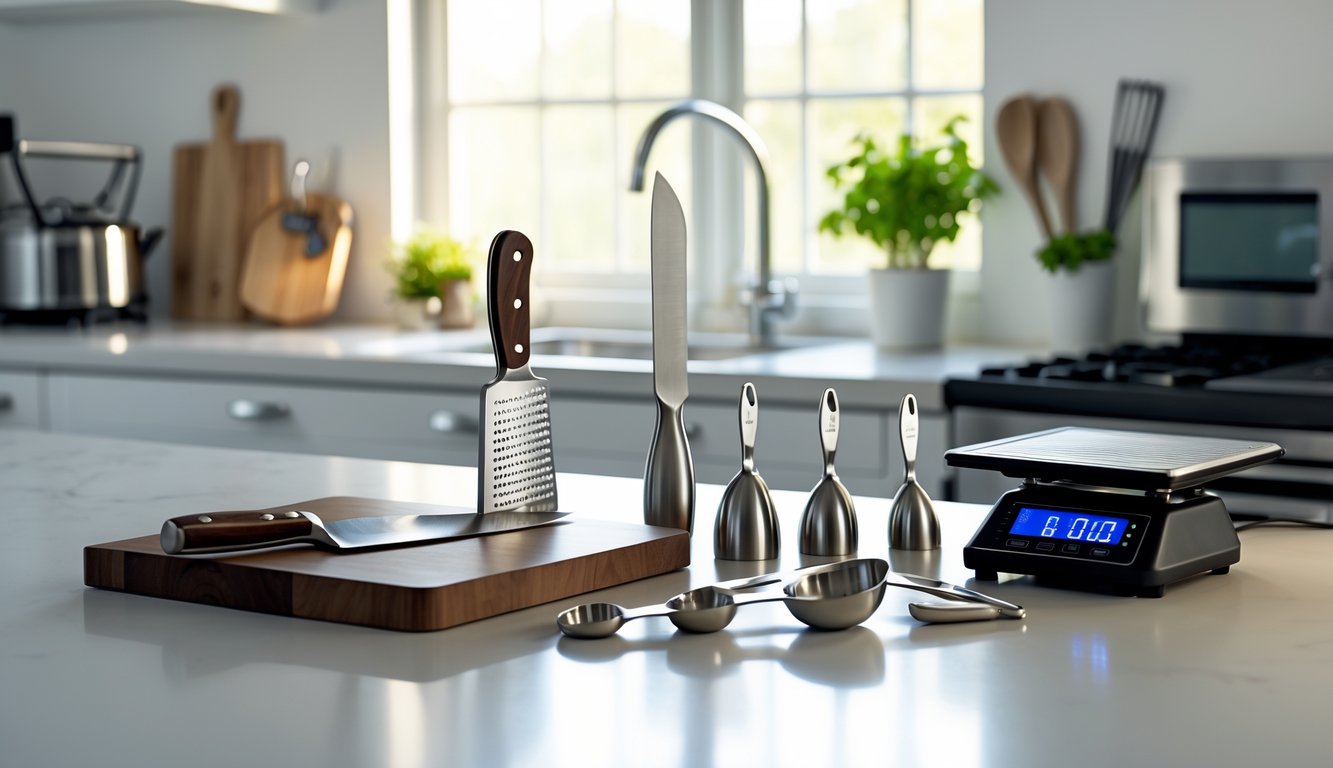
Maintenance Routines to Extend Tool Lifespan
I keep telling myself I’ll replace the garlic press, but let’s be honest—maintenance is the only thing keeping half my tools alive. My chef buddy swears most people toss stuff that just needs a little love. Dull blades and rusty patches slow you down and ruin food. A couple of good habits and some random tricks? That’s what actually keeps tools around.
Proper Cleaning and Storage
Ever try cleaning a microplane zester? Lemon zest gets stuck in those teeth and never lets go. Warm water alone won’t cut it—grab a brush (toothbrush works, whatever) and use soapy water right away. Don’t soak tools unless you like warped handles. Dishwashers? They say “dishwasher safe,” but carbon steel knives and even some plastics get ruined in there. You’ll end up with weird gray stains that never go away.
One chef I know lines her drawers with nonslip mats, keeps shears and spatulas in canvas rolls, and labels everything (sticky notes at first, then muscle memory). If you throw prep spoons in with rusty whisks, expect weird black flecks in your ganache. Every maintenance guide says keep tools handy and check them weekly. I once left a whisk in the salad spinner for days—now I use clear bins for small stuff. Turns out, if I can see it, I’m more likely to clean it.
Sharpening and Maintenance Tips
Some cookbooks swear by honing steels—honestly, unless you like hacking tomatoes to pieces, that’s not enough. I’ve tried using Japanese whetstones in my tiny sink (not recommended), but pros say consistency matters more than fancy gear. Even a basic pull-through sharpener, used monthly, beats any “miracle” spray.
If you’re not checking for loose screws on mandolines or mixer paddles, you’ll end up with metal shavings in your food. Sharpening is just part of it; lost bolts and sticky joints ruin tools faster than dull blades. Industry folks say a quick weekly check—look for cracks, listen for weird noises—catches most problems. My uncle dunks tool hinges in mineral oil (even salad spinner gears), which fixed an old squeak, but I wouldn’t try that on anything electronic. And why does nobody use masking tape to flag a dull knife? Everyone waits until they slip and swear off carrots for a week.
Frequently Asked Questions
My drawer’s full of gadgets nobody else seems to use, and yet there’s always a rusty whisk lurking around. My apron probably knows more kitchen secrets than YouTube—like why serrated knives end up on bread duty or why a cheap peeler beats every “innovative” gadget for speed.
What are the go-to gadgets that every chef has in their arsenal?
Microplane: parmesan snow everywhere, but honestly, nothing ruins a Caesar faster than thick cheese chunks. Chefs hoard offset spatulas for everything, even scraping out jars. My digital scale is covered in olive oil fingerprints from last week.
And then the battery dies right when I need it. Why aren’t these things rechargeable yet?
Can you list essential tools that professional chefs recommend for an efficient kitchen?
I once tried to break down a butternut squash with a dull knife—almost cried. Sharp chef’s knives are non-negotiable, always the first thing I unpack. Food & Wine says even a good silicone spatula is more useful than half the junk cluttering your drawer.
Cutting boards? Wood or thick plastic only. Glass looks nice but destroys my knuckles. Tongs—spring-loaded, not pretty, but they keep dinner from burning.
What advanced equipment do chefs use daily that home cooks might not know about?
Sous vide circulators just hum along in my kitchen. No one suspects I’m slow-poaching eggs while icing a cake. Sometimes it’s a vacuum sealer, but my weird favorite is a heat gun from the hardware store.
Nobody warns you, but the first time you torch a custard, your smoke alarm gets more action than your guests. I borrowed a pacojet once—frozen basil never tasted so good.
What’s in a professional chef’s tool kit bag that makes food prep quicker?
Mortar and pestle stuffed in a carry-on—awkward, but perfect for garlic. Paris Gourmet’s guide says ergonomic shapes and speed matter more than gimmicks, so I keep a mandoline, fish tweezers, and a bench scraper around. Industrial towels for panic spills, obviously.
Still, someone always walks off with my favorite peeler. Why don’t they make lockable cases for those?
What are the best kitchen investments for those looking to cook like a pro?
Never regretted splurging on a Japanese carbon steel knife, even if it rusts the second you forget to dry it. Culinary Chefs Edge repeats that high-quality tools save you from endless headaches.
Weirdly, the only cheap thing that lasted was a flat wooden spoon from a street market—survived more hot caramel than my last relationship. And I’ll never buy another blender that can’t handle nut butter in under a minute.
Are there any underrated kitchen utensils that top chefs swear by for everyday cooking?
Mini fish spatula. Honestly, why does nobody talk about this thing? I use it for eggs, pancakes, cookies—basically, if it’s flat and hot, out comes the fish spatula. And sure, I probably read it on some listicle (Dalstrong’s tool list), but the bench scraper? That’s the sneaky MVP. I’m scooping up dough, shoving chopped onions into a pot, scraping up coffee sludge when I spill (again).
Spider skimmer just sits there, looking like a weird wire UFO, but try fishing out dumplings without it. Go ahead, I dare you. I own three. Not a single one matches. Why do I keep buying more? No clue. But if I lost them, I’d probably just give up on pasta forever.